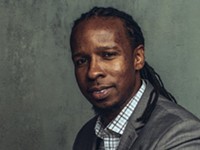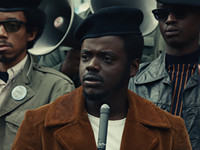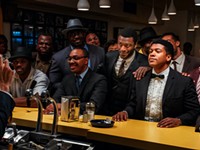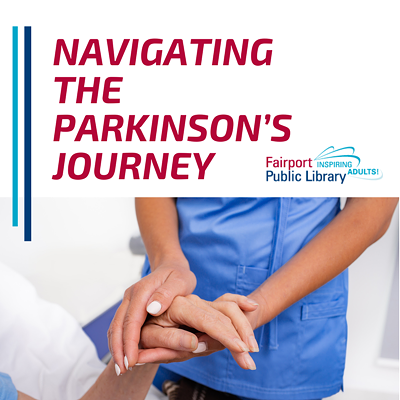Streaming: Miniseries reimagines "Hollywood" as more inclusive, earlier on
By Adam Lubitow @adamlubitow[
{
"name": "500x250 Ad",
"insertPoint": "5",
"component": "15667920",
"parentWrapperClass": "",
"requiredCountToDisplay": "1"
}
]
The basic thesis of “Hollywood,” creator Ryan Murphy’s revisionist history of post-World War II Hollywood, is spelled out early in the series’ second episode. Aspiring director Raymond Ainsley (played by Darren Criss) is pitching the head of production (Joe Mantello) at the fictional Ace Studios, imploring the studio executive to take a chance on making his film.
“Sometimes I think folks in this town don’t really understand the power they have. Movies don’t just show us how the world is, they show us how the world can be,” Raymond says during the pitch. “And if we change the way that movies are made — you take a chance and you make a different kind of story — I think you can change the world.”
The sentiment is undeniably schmaltzy, and whether its central idea is one that moves you depends entirely on how much stock you put in the movies and their ability to generate real-world change.
Murphy’s series, which debuted last week on Netflix, is a lush reimagining of Hollywood’s Golden Age. It explores what it might have looked like if the gatekeepers of the movie industry had gotten hip to the need for more inclusive onscreen representation back then, and made an effort to diverge from the sexism, racism, and homophobia of the time to forge a new path.
Working with frequent collaborator Ian Brennan, Murphy created a show that has quickly inspired as many vitriolic dismissals as it has passionate defenses. While the response from most critics has generally been cold, the slickly-produced entertainment of “Hollywood” (and the idealistic message behind it) seems to have resonated with many viewers.
In many ways a classic showbiz tale, the seven-episode series follows the paths of several young hopefuls dreaming of fame and stardom in motion pictures. There’s Raymond (Criss), a half Filipino director who’s able to pass as white; his black girlfriend Camille (Laura Harrier), an actress tired of being relegated to domestic servant roles on screen; and Archie (Jeremy Pope), a black, gay screenwriter who enters into a romantic relationship with then-unknown actor Rock Hudson (Jake Picking).
The throughline revolves around efforts to produce Archie’s script “Peg,” based on the real story of Peg Entwhistle, a struggling actress who leapt to her death from the Hollywood sign. Eventually, Raymond attempts to convince the new studio head (Broadway legend Patti Lupone), who’s taken over for her incapacitated husband, to allow Archie to reconfigure the story as “Meg,” with Camille taking on the leading role.
Along the way, characters cross paths with a host of real-life figures. Besides Hudson, there’s also actress Hattie McDaniel (Queen Latifah) and Anna May Wong (Michelle Krusiec), two legendary performers who in life never got the recognition they deserved, forced to build careers on roles that perpetuated racist sterotypes. The intermingling of actual Hollywood history with fiction is bound to displease some cinephiles.
Though the main focus of “Hollywood” remains on its fictional leads, the intention isn’t to erase the legacy of those real artists whose pioneering efforts helped drag the industry forward. And if watching “Hollywood” inspires even a few viewers to search out works like Anna May Wong’s film “Piccadilly,” “Written on the Wind” starring Rock Hudson, or “Show Boat” with Hattie McDaniel, that alone would make it worthwhile.
Some have dismissed the series as self-congratulatory, just another example of Hollywood celebrating Hollywood. But those assertions miss the show’s undercurrent of sadness — if not outright anger — over decade upon decade of missed opportunities. If change in the business had started back then, where might we be now?
The intriguing concept isn’t always executed flawlessly; the show’s idealistic portrayal of what Hollywood could be sometimes clashes with its desire to depict the hedonistic underbelly of all that glitz and glamour. It also shares a few of the issues that plague Murphy’s other projects:
a tendency toward overplotting, and a tone that varies wildly between earnestness and soapy melodrama. And in its eagerness to show the positive outcomes that can come from change, “Hollywood” can sometimes overstate the ease with which those ideals are achieved.
The Hollywood seen here is a place where struggling actors must resort to turning tricks, hired at a full-service gas station that fronts an escort service catering to a high profile clientele. That business is inspired by a real place, run by a man named Scotty Bowers, who was the subject of the fascinating 2017 documentary “Scotty and the Secret History of Hollywood.”
It helps that Murphy and Brennan made an effort to include other storytellers behind the scenes, like Janet Mock — a black trans female writer and filmmaker whom Murphy (who’s openly gay) previously worked with on “Pose” — as executive producer, writer, and director on several episodes. The presence of voices like Mock’s lend authenticity to the show’s depiction of the struggles of marginalized artists.
“Hollywood” is a lavish Tinseltown fairy tale, with lush period production design and a glamorous, attractive cast. But the glitzy fantasy at its heart remains a bittersweet one. It isn’t just a celebration of the power of film, but a condemnation of the fact that more hasn’t been done to fix the industry’s very real problems. When we watch its characters debate whether white audiences will accept a black actress as the lead in a major movie in 1947, we know those exact same arguments are still being rehashed in 2020.
Maybe this is the perfect time to release a series like “Hollywood.” COVID-19 has put a pause on all feature films that were currently and about to be sent into the pipeline, and those with the power to greenlight films now have a moment to consider what they want to say with their work before productions start up again.
The world we know won’t look the same when we emerge from this pandemic. It’s drawn our attention to the many broken systems our society is built on, from top to bottom. Movies aren’t the most pressing issue we’re facing. But maybe they can inspire us to rewrite the kind of world we wish to see once we’re on the other side.
Adam Lubitow is a freelancer for CITY. Feedback on this article can be directed to Rebecca Rafferty, CITY's arts & entertainment editor, at [email protected].













